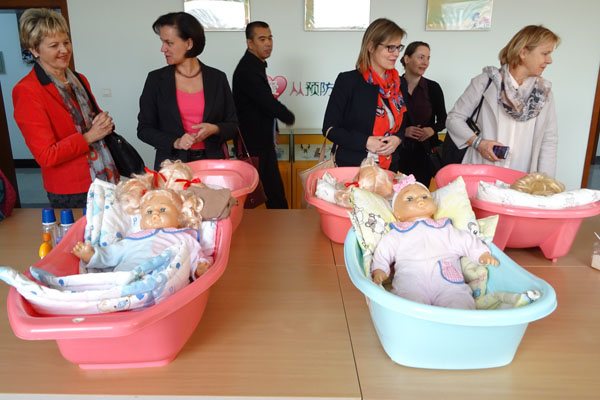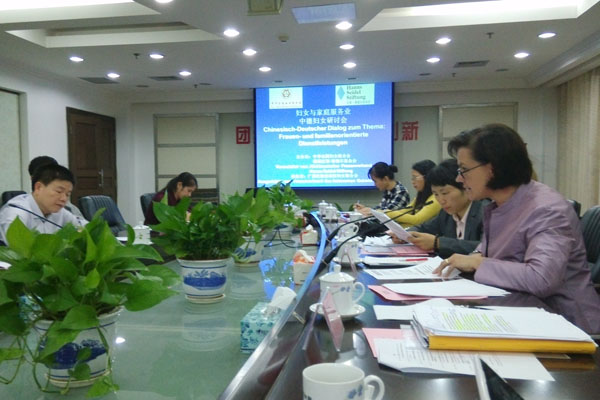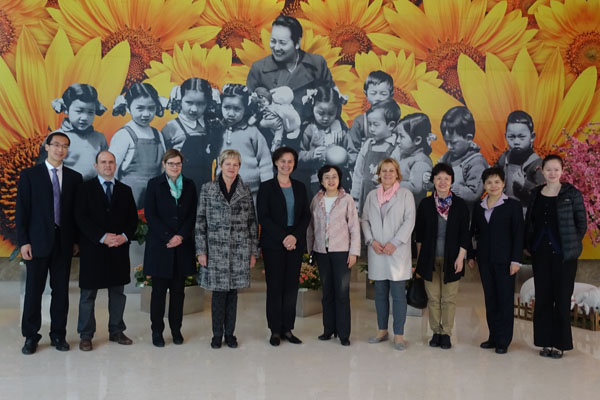International Exchange regarding family-oriented services
As part of the cooperation between the Hanns-Seidel-Foundation (HSS) and the All-China Women’s Federation (ACWF) a Bavarian delegation, led by Dr. Ute Eiling-Hütig, member of the Landtag, stayed in China from November 2nd until 7th 2015. Made up of representatives of different political levels, the delegation focused on family-oriented services in urban centers as well as rural regions in Beijing and the southern Chinese province of Guangxi. A symposium regarding challenges in family-policy and developments against the background of social demographic changes was part of the program as well.
The All-China Women’s Federation is the biggest women’s rights organization in China, promoting gender equality as well as interests and legal rights of women and children. Cooperation with the HSS started in 2003 and focuses mainly on advancing the status of women in work, family and society via academic and political dialogue, vocational qualification and joint micro-loan projects to improve economic participation of women in western China.
Vocational qualification of house keepers and caregivers of Nanning
Familiy-oriented services in Beijing
The stay in Beijing kicked off with debates about measures to improve economic participation of women as well as the loosening of the Chinese one-child-policy, which were discussed in a conversation with Meng Xiaosi, vice-president of the ACWF. Low birth rates are a major problem, not only for China but also for Germany, says Eiling-Hütig. Hence child and elderly care were intensively discussed. Especially rural areas are working on enabling economic participation and care of relatives.
The delegation caught up on family-oriented services in Beijing during a visit to a service center for women and children, which provides information services as well as training for women.
In Nanning and surrounding areas, delegation members were able to see examples of the implementation of family policy in the autonomous area Guangxi through visits to establishments and projects supported by the local Women’s Federation. Here, especially practical training to prepare for entry into work life of women from rural areas is provided. Currently there is an exceptionally high level of demand in the nursing and household sectors, which enables women to secure higher-than-average incomes after training.
Promoting women in rural areas
A symposium on women- and family-oriented services provided delegation members and participants with an opportunity to discuss current challenges and solutions for the advancement of women’s rights in Germany and China further.
Wu Xiaoli, first deputy chairwoman of the Women’s Federation in Guangxi, opened the event by presenting an overview of the work of the local Women’s Federation, which is represented on all administrative levels of the province and cooperates closely with authorities. Wu mentioned some particularly successful fields of work, for instance the granting of low-interest loans for business start-ups as well as legal protection and advice. Other important working fields include free treatment and financial aid for cancer patients who are exposed to extreme poverty.
The number of orphanages and child centers in villages is increasing and several charitable projects in areas particularly affected by poverty contribute to the improvement of living conditions of women as well as children.
As an important actor in family-oriented services, women make a significant contribution to the economy of Guangxi, said Tu Yongsen, representative of the Office for Human Resources and Social Security of Guangxi. Support measures and training institutes play a key role in this process.
Ute Eiling-Hüting provides information about family-policy benefits in Germany
Increasing attractiveness of family formation
Eiling-Hütig provided an overview of the most important family policy benefits in Germany, which include, among others, entitlement of paternity/maternity leave for employees as well as the financial benefits for both mothers and fathers. If both partners share the parental leave, two additional months are granted to increase the attractiveness of the paternity leave.
Following Eling-Hüting’s presentation, Maria Eichhorn, former member of the Bundestag, introduced the work DONUM VITAE, a comprehensive counselling center, which provides free and anonymous consulting concerning all topics related to pregnancy. She also also stressed the growing relevance of the care for the elderly.
Visit of the National Museum for Women and Children Beijing
Abandoning the one child policy
As to why China has turned away from its previous one-child-policy, Wu explained that social changes as well as economic and social aspects led to the decision in favor of a two-child-policy. The situation has substantially changed since the 1980s. Back then, population growth had to be stopped due to concerns regarding possible food shortages. All in all, the one-child-policy contributed to the reduction in population growth by several hundred millions.
Both sides expressed their wish to continue the exchange regarding family policy. The blending of high-level talks, academic debates as well as visits to establishments and projects at the implementation level was regarded as especially informative and should be maintained in the future.
Author: Alexander Birle



